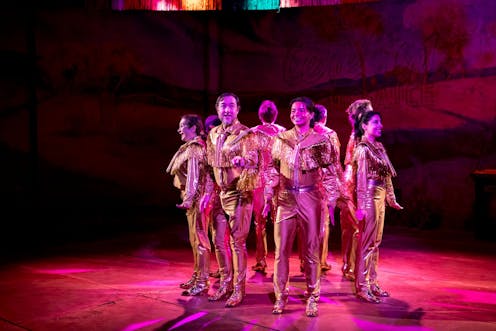Belvoir’s The Boomkak Panto is a joyous, subversive and Australian twist on the classic Christmas tradition
- Written by Gabriella Edelstein, Lecturer in English, University of Newcastle

This review contains spoilers.
Review: The Boomkak Panto, directed by Richard Carroll and Virginia Gay, Belvoir
The great Victorian playwright George Bernard Shaw was not an admirer of pantomimes. He wrote in 1897 that this dramatic genre is “a glittering, noisy void”, which worries “the physical senses without any recreative appeal to the emotions and through them to the intellect”.
What value, then, can there be to a pantomime? As Virginia Gay and Richard Carroll’s exuberant The Boomkak Panto shows, pantomime as a genre may be utterly bonkers and fundamentally nonsensical, but it offers audiences the possibility of irreverence, joy and, most importantly, community.
The Boomkak Panto centres on the inhabitants of the fictional “Little Aussie Town™” of Boomkak, who are fighting to save their home from the evil Big Developer’s scheme of building a freeway, high-density housing or a casino.
In classic meta-theatrical tradition à la The Muppets, the townspeople plan to put on a panto to raise money and save their town.
No pretence to realism
For the uninitiated, pantomime – or panto, as it is more affectionately called – is a type of British theatrical entertainment mainly for children played around Christmas. They are comedic retellings of fairy tales and nursery rhymes, from Mother Goose to Cinderella.
There’s song and dance, slapstick, extravagant sets and outrageous costumes, enormous casts, audience participation, clowning, cross-dressing, puns galore, satirical topical references – and no pretence to realism.
Pantomime, as the anti-panto Alison (Virginia Gay, who also wrote and co-directed the production) tell us, is void of structure, tone, logic, emotion and time, where “things seem to happen without cause or effect”. Especially when the villain is somehow trounced, the lovers marry and order is magically restored at the happy ending.
Although pantomime is now a distinctly British art form, it has its origins in the Italian commedia dell’arte, a masked, clowning style of acting, which was nativized in England as the Regency harlequinade.
During the Victorian period – the heyday of panto – the entertainment was transformed into an extravagant spectacular. While the genre is still popular throughout Britain, you would be hard pressed to find a panto in Australia today.
Read more: A brief history of the pantomime – and why it's about so much more than 'blokes in dresses'
How, then, do you refresh pantomime for a modern Australian audience? You make it a queer love story set in the Outback, of course.
Gender play
The true heart of the show is the love story between Zoe (Zoe Terakes) and Yazmin (Mary Soudi). Zoe is a young queer person who has found their identity. Yazmin is the daughter of an Iranian refugee who feels the pressure of living up to her mother’s high expectations.
There has always been something subversive about panto, particularly when it comes to its carnivalesque play with gender.
Traditionally, the panto’s protagonist is the prince, known as the Principal Boy – although the audience is perfectly aware this strapping lad is actually a woman in men’s clothing.
(This type of casting is known as a breeches role, which emerged in the 1660s with the introduction of the English actress, but it was mostly an excuse to show women’s legs in tights.)
There is also the Panto Dame, a middle-aged man in campy drag, playing a matronly woman always on the hunt for a new husband.
The reversals of gender in pantomime highlight and parody rituals of masculinity and femininity, and the extent to which gendered identity is performed. But it also relies on sexist reproductions of gender, presenting women’s bodies as either highly sexualised or grotesque.
One of The Boomkak Panto’s subversive innovations is its treatment of gender. Rather than having the Principal Boy as a sexualised woman who just happens to be in boy’s clothing, the play’s hero is the non-binary Zoe. Their gender identity isn’t performed to the audience for laughs, but with heart and empathy.
Happy endings
When all seems lost, the Big Developer (hilariously played by Rob Johnson) strikes a bargain with the townspeople: if they can perform something “true and beautiful” in their panto, he will leave the town. As may come as no surprise, all’s well that ends well.
The highlight of the show is the panto-within-a-panto: Aladdin with a twist. Like the play’s treatment of gender, Gay and Carroll take this most problematic of stock pantomimes and make it ironic, simultaneously showing their love for the art form while refreshing it with Australian humour, sex jokes and plenty of swear words.
The panto in this play is meant to bring the community together and, for us, The Boomkak Panto does exactly that: the audience was overjoyed to be back in the theatres after lockdown, cheering and booing along with the play’s rollicking plot.
But pantomime is also based on fairy tales. The idealised Boomkak doesn’t exist, and theatre cannot save the day from the developments that are destroying small towns and big cities alike. While The Boomkak Panto may indulge a little too much in a happy ending that does not offer the same satirical bite as the rest of the play, the production shows there is still much to love about pantomime.
The Boomkak Panto plays at Belvoir, Sydney, until December 23.
Authors: Gabriella Edelstein, Lecturer in English, University of Newcastle





